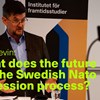demo
IFSIM Handbook
This handbook explains the simulation model IFSIM, which is an agent based simulation model written in JAVA. The model is constructed for analyzing demographic and economic issues and its aim is to in
The Demos and Its Critics
The Review of Politics, 81(3), 435-457. doi:10.1017/S0034670519000214 Abstract The “demos paradox” is the idea that the composition of a demos could never secure democratic legitimacy because the composi
Deciding the demos: three conceptions of democratic legitimacy
Critical Review of International Social and Political Philosophy, http://dx.doi.org/10.1080/13698230.2017.1390661 Abstract The prevailing view is that democratic procedures are unable to confer democrati
Excluding Citizens: Belongership and the Constitutional Demos in British Overseas Territories
Ethnopolitics Abstract Previous literature explains the fact that sub-national elections tend to be more inclusive than national elections by reference to the level of the election. This paper argues th
The Democratic Inclusion of Artificial Intelligence? Exploring the Patiency, Agency and Relational Conditions for Demos Membership
Philos. Technol.35, 24 Abstract Should artificial intelligences ever be included as co-authors of democratic decisions? According to the conventional view in democratic theory, the answer depends on the

Paul Levin: What does the future hold for the Swedish Nato accession process?
What is the current state of play in the negotiations between Sweden, Finland, and Turkey over NATO accession? Is Finland going it alone and, if so, what would that mean for Sweden and NATO? What can
Research seminar: Paul Levin
Place: ATTENTION! This seminar will be held at CityLife, Sveavägen 63, Stockholm, close to Handelshögskolan. Coffee and light sandwich will be served from 09.30. You can also join online. REGISTERResearch, the Director of the Stockholm University Institute for Turkish Studies and Managing Director of the Consortium for European Symposia on Turkey. A frequent commentator of Turkish affairs in Swedish and international media, he is a Docent in International Relations, having received his Ph.D. in the same subject along with an M.A. in Political Science from the University of Southern California and a Fil. Kand. In Practical Philosophy from Stockholm University.

Ludvig Beckman
I am Professor in Political Science at Stockholm University. In 2000 I defended my dissertation at Uppsala University. I participate in the research project "The Boundary Problem in Democratic Theory" t
Studies on the boundary problem in democratic theory
Working papers 2022:1-11 Editor: Paul Bowman Proximity Principle, Adieu Robert E. Goodin Reconceiving the Democratic Boundary Problem David Miller The Boundary Problem and Platitudes About Democracy: A Conc
David Miller: Boundaries, Democracy and Territory
Professor David Miller, Nuffield College at the University of Oxford. ABSTRACT The paper I will be presenting asks the general question ‘What boundaries between political units ought there to be?’ Reje








